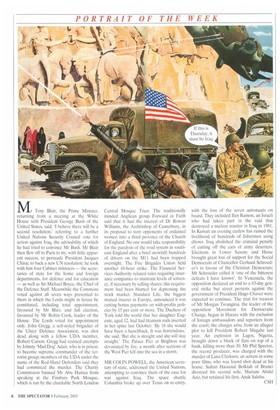M r Tony Blair, the Prime Minister, returning from a meeting
at the White House with President George Bush of the United States, said, 'I believe there will be a second resolution,' referring to a further United Nations Security Council vote for action against Iraq, the advisability of which he had tried to convince Mr Bush. Mr Blair then flew off to Paris to try, with little apparent success, to persuade President Jacques Chirac to back a new UN resolution; he took with him four Cabinet ministers — the secretaries of state for the home and foreign departments, for defence and for education — as well as Sir Michael Boyce, the Chief of the Defence Staff. Meanwhile the Commons voted against all seven ways presented to them in which the Lords might in future he constituted, including total appointment, favoured by Mr Blair, and full election, favoured by Mr Robin Cook, leader of the House. The Lords voted for appointment only. John Gregg, a self-styled brigadier of the Ulster Defence Association, was shot dead along with a fellow UDA member, Robert Carson. Gregg had resisted attempts by Johnny 'Mad Dog' Adair, who is in prison, to become supreme commander of the terrorist group; members of the UDA under the name of the Red Hand Defenders said they had committed the murder. The Charity Commission banned Mr Abu Hamza from speaking at the Finsbury Park Mosque, which is run by the charitable North London Central Mosque Trust. The traditionally minded Anglican group Forward in Faith said that it had the interest of Dr Rowan Williams, the Archbishop of Canterbury, in its proposal to turn opponents of ordained women into a third province of the Church of England. No one would take responsibility for the paralysis of the road system in southeast England after a brief snowfall; hundreds of drivers on the M1 1 had been trapped overnight. The Fire Brigades Union held another 48-hour strike. The Financial Services Authority relaxed rules requiring insurance companies to maintain levels of solvency, if necessary by selling shares; this requirement had been blamed for depressing the stock market. Standard Life, the biggest mutual insurer in Europe, announced it was cutting bonus payments on with-profits policies by 15 per cent or more. The Duchess of York told the world that her daughter Eugenie, aged 12, had had titanium rods inserted in her spine last October: 'By 18 she would have been a hunchback. It was horrendous,' she said. 'But she is straight and she will stay straight.' The Palace Pier at Brighton was devastated by fire, a month after sections of the West Pier fell into the sea in a storm.
MR COLIN POWELL, the American secretary of state, addressed the United Nations, attempting to convince them of the case for war against Iraq. The space shuttle Columbia broke up over Texas on re-entry, with the loss of the seven astronauts on board. They included Ilan Ramon, an Israeli who had taken part in the raid that destroyed a nuclear reactor in Iraq in 1981. In Kuwait an evening curfew has ruined the livelihood of hundreds of fishermen using dhows. Iraq abolished the criminal penalty of cutting off the ears of army deserters. Elections in Lower Saxony and Hesse brought great loss of support for the Social Democrats of Chancellor Gerhard Schroeder's in favour of the Christian Democrats: Mr Schroeder called it 'one of the bitterest defeats I have known'. In Venezuela, the opposition declared an end to a 63-day general strike but street protests against the government of President Hugo Chavez were expected to continue. The trial for treason of Mr Morgan Tsvangirai. the leader of the opposition Movement for Democratic Change, began in Harare with the exclusion of foreign ambassadors and reporters from the court; the charges arise from an alleged plot to kill President Robert Mugabe last year. An explosion in Lagos, Nigeria, brought down a block of flats on top of a bank, killing more than 30. Mr Phil Spector, the record producer, was charged with the murder of Lana Clarkson, an actress in some poor films, who was found shot dead at his house. Sultan Hassanal Bolkiah of Brunei divorced his second wife, Mariam Abdul Aziz, but retained his first, Anak Saleha.


























































 Previous page
Previous page